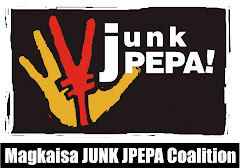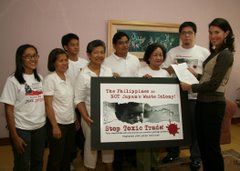A commentary from the Philippine Daily Inquirer, published last April 14, 2008 (original link here).
The ultimate treason
By Ester V. Perez de Tagle
MANILA, Philippines - When theSpratlys exploration deal was linked to the NBN project and other mega-projects, the web of corruption was exposed to have a more serious dimension—treason by sellout.
But hidden in the voluminous pages of another but bigger agreement is the mother of all sellouts: the Japan-Philippines Economic Partnership Agreement (Jpepa). Once ratified, it will beget other similar EPAs; other countries would understandably want to get the same terms as Japan. Who would not want to enjoy equal rights with Filipinos to exploit the land and waters of an internationally recognized natural resources superstar and center of global marine biodiversity?
There is no need to dig up damning evidence of the sellout from other documents or to extract it from witnesses. It is right there, in its text.
Loss of Philippine sovereignty. The Jpepa tramples on our Constitution and other laws and the people’s constitutional right to participate in economic decision-making. It usurps the legislature’s constitutional power to exercise authority over commerce and trade. An example is the unilateral elimination of tariff protection within 11 years. This would result in the much-increased inflow of aggressively priced Japanese goods, thereby killing the backbone of our economy—our small and medium industries, which are already suffering from government neglect. Massive unemployment would follow.
The Jpepa also usurps the constitutional power of our local government units (LGUs) to enjoy local autonomy, including the power to create their own revenue sources. Future legislation relating to investments will no longer be possible with the minimal and wrong reservations or exemptions the Philippine panel made and Japan’s various extensive reservations to protect its interests.
The Philippine panel also agreed to remove the phrase in previous Philippine bilateral investment agreements that allow for national legislative flexibility on “investments … made in accordance with the legislation of that contracting state.” The Jpepa is thus beyond the reach of Philippine legislation, present or future.
It even plans to “examine the possibility of amending or repealing laws and regulations that pertain to, or affect the implementation and operation of this agreement.” (Art. 4) Philippine laws exist for the good of our people but would be amended or repealed to accommodate the Jpepa.
National Treatment (Art. 89) accords the Japanese investors equal rights as Filipinos in the exploitation of our natural resources. It would be open season for our priceless flora and fauna, with Japan getting the first shot! How ironic, considering that it never apologized for the atrocities it committed against our people during World War II. Worse, Japan’s comprehensive reservations and our lack of the same make this provision nonreciprocal.
Annex 7, 2B of Jpepa would allow Japanese large-scale fishing in our already badly depleted seas. With economies of scale, their hi-tech factory ships would enjoy unfair competitive advantage over our poorly equipped fishing boats. Who would buy our products? The same could happen to our agriculture and agro-forestry. The plight of the Sumilao farmers would be replicated many times over. Much of our limited land and water, which should be used to plant food crops, could be used by the Japanese to plant biofuel feedstock for their energy needs, thus endangering our food and water security. Forest destruction would worsen. The Jpepa would legitimize biopiracy. Protected by Art. 90, the Japanese could patent their manufacturing processes to prevent us from commercially using our own bio-resources. Jpepa provides neither sufficient safeguards to protect our country’s rich bio-resources nor provisions on access and benefit-sharing.
Japan, a small island state, cannot cope with the toxic waste generated by its high industrialization. An AP Tokyo 1998 news report says “Japan has a new export for the world—garbage. Export of hazardous materials is banned by international conventions. So, businessmen are just calling it something else.” Health and welfare ministry official Tatsuro Akashi confirmed this, saying “There is no objective definition to distinguish waste from goods.” In the Jpepa Tariff Lines, waste is entitled to preferential treatment and granted a tariff rate of 0 percent. Another threat is that Japan, to avoid the toxic and hazardous waste generated by its many dirty industries, may relocate these in the Philippines.
Articles 95 and 96 not only give the Japanese more rights than Filipinos, they also open our government to multimillion-dollar suits. Article 93 prohibits the Philippines from imposing on Japanese investments any technology transfer and any hiring of Filipinos. The Japanese do not impose these in their treaties with other countries. So, what benefits do our people get from the Jpepa? Even our nurses, supposedly among its biggest beneficiaries, reject it. Philippine Nurses Association president Leah Paquiz wrote a paper against it. Decent, fair-minded Japanese, like Japan’s Christian pastors, decry its great injustice to the Filipino people.
The Jpepa shows what happens when the greed for wealth and power blinds governments to what is right and turns them into predators. But the worst predators are those who turn against their own land and people.
Ester V. Perez de Tagle is the founder of Concerned Citizens Against Pollution (Cocap). She was a member of the congressional TWGs of several environmental bills that became law.
Tuesday, April 22, 2008
Subscribe to:
Post Comments (Atom)






No comments:
Post a Comment